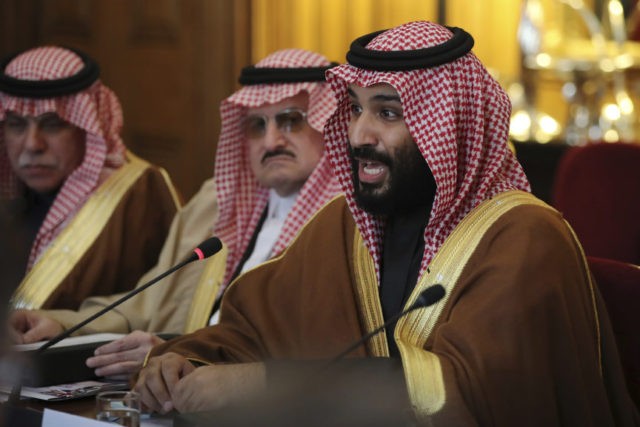Saudi Arabia’s Crown Prince Mohammed Bin Salman insisted in an interview with 60 Minutes aired Sunday that he will enact reforms to ensure equality of the sexes, claiming that a Saudi “equal pay” initiative is in the works despite the country not yet allowing women to drive or conduct many basic activities without a male guardian.
Bin Salman, known by his initials MBS, will meet with President Donald Trump in Washington on Tuesday for an official visit. MBS has worked to strengthen ties to the United States since assuming the position of Crown Prince and since Trump assumed the presidency. Trump made Saudi Arabia a stop on his first overseas trip as president in May.
Speaking to 60 Minutes‘ Norah O’Donnell, MBS emphasized the importance of gender equality, answering that men and women are “absolutely” equals—”We are all human beings and there is no difference” – and previewing plans he has to make the country more open for women.
MBS explained that his objection to the current state of affairs in the country, government by strict Wahhabist Sunni Islam, is that the repressive nature of this sharia rule is not Saudi Arabia’s traditional state. Referring to Saudis as “victims” of the 1979 Islamic Revolution in Iran, he encouraged viewers to “use their smartphones to find out. And they can google Saudi Arabia in the 70s and 60s, and they will see the real Saudi Arabia easily in the pictures.”
“We were living a very normal life like the rest of the Gulf countries. Women were driving cars. There were movie theaters in Saudi Arabia. Women worked everywhere. We were just normal people developing like any other country in the world until the events of 1979,” he claimed.
MBS insisted that the sexes were equal and that sharia, the Islamic law, did not specify how women should dress beyond requiring them to do so modestly.
“The laws are very clear and stipulated in the laws of Sharia: that women wear decent, respectful clothing, like men. This, however, does not particularly specify a black abaya or a black head cover,” he said, referring to the black clothing the Saudi regime currently imposes on women. “The decision is entirely left for women to decide what type of decent and respectful attire she chooses to wear.”
Bin Salman went as far as to say that the “extremists” who demand the sexes be separated at all times are adhering to ideas that “contradict the way of life during the time of the prophet and the Caliphs. This is the real example and the true model.”
Among the programs he wishes to implement, he told O’Donnell, was an “equal pay” initiative, touching on a subject that has become extremely popular among American feminists.
“We are working on an initiative, which we will launch in the near future, to introduce regulations ensuring equal pay for men and women,” he said.
O’Donnell challenged him on the notion of arguing for equal pay for women in a country where women largely remain out of the public eye by law.
“But you’re talking about equal pay,” she noted. “Women can’t even drive in this country. This is the last, last place in the world that women don’t have the rights to drive.”
MBS replied that the reason women could not drive yet is because they still need driving lessons. “This is no longer an issue. Today, driving schools have been established and will open soon. In a few months, women will drive in Saudi Arabia. We are finally over that painful period that we cannot justify,” he claimed.
O’Donnell then challenged him on Saudi Arabia’s guardianship laws. All Saudi women must have male guardians, typically a husband or father, who have the authority to determine much of their lives. Saudi women need their guardian’s consent to travel and get married, among other basic life activity. Only recently have Saudi officials began repealing some guardian consent laws, including the requirement that women receive permission from a male guardian before opening a business.”
“Today, Saudi women still have not received their full rights,” MBS told O’Donnell. “There are rights stipulated in Islam that they still don’t have. We have come a very long way and have a short way to go.”
Among the many other topics discussed, Bin Salman expressed frustration with the Saudi education system, arguing that it had been “invaded” by the Muslim Brotherhood, who had indoctrinated generations of Saudis with jihadist theology.
“Saudi schools have been invaded by many elements from the Muslim Brotherhood organization, surely to a great extent. Even now, there are some elements left. It will be a short while until they are all eradicated completely,” he promised.
“No country in the world would accept that its educational system be invaded by any radical group,” MBS added.
Since rising to the Crown Prince position, MBS has called for the imposition of “tolerant, moderate Islam” on Saudi Arabia, incensing regional Islamist leaders such as Recep Tayyip Erdogan of Turkey.

COMMENTS
Please let us know if you're having issues with commenting.